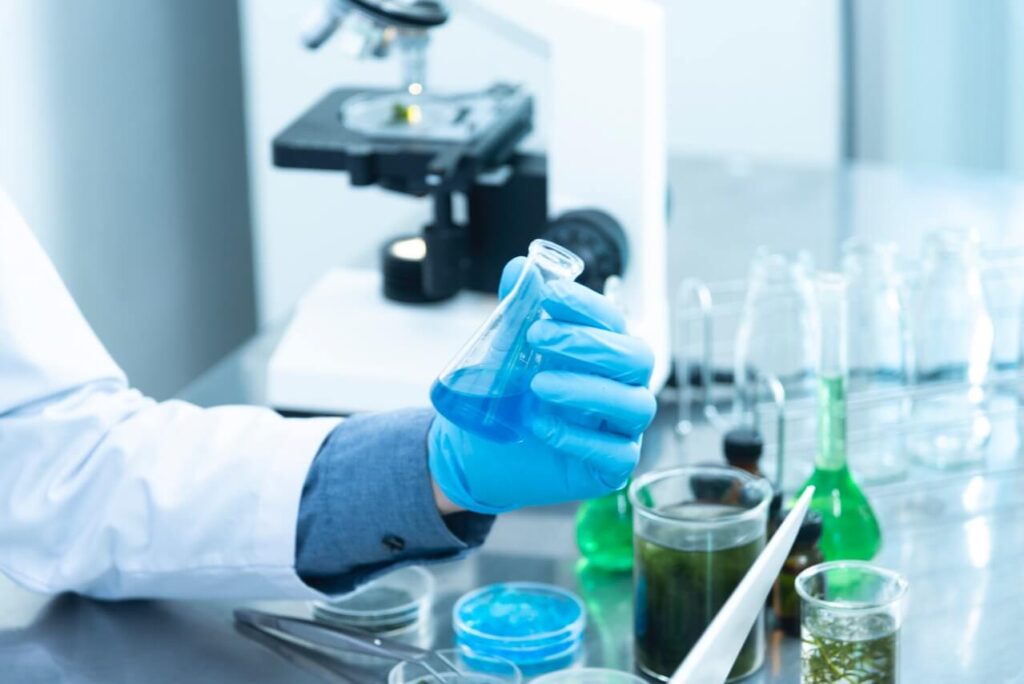Sustainability Trends In Chemical Industry

Chemical Industry Trends in 2023: Innovations and Transformations Ahead
The sustainability trends in the chemical industry is a vital sector that plays a crucial role in the global economy.
1. Sustainability Trends In Chemical Industry Takes Center Stage:
Sustainability has become a critical focus for the chemical industry trends, is set to continue in 2023. There will be a growing emphasis on reducing carbon emissions and adopting sustainable production processes.
Consumers, investors, and regulators demand sustainable products, which drives this shift towards sustainability. Companies will increasingly adopt renewable energy sources, circular economy models, green chemistry, and biotechnology to create more sustainable products.
At Sarchem Labs, we are committed to helping our clients adopt sustainable practices and protecting our planet for future generations.
2. Digitalization and Industry 4.0:
Digitalization and Industry 4.0 technologies are transforming the way chemical companies operate. Automation, artificial intelligence, and machine learning are improving efficiency, reducing costs, and improving product quality. In 2023, we expect to see even greater adoption of these technologies as companies seek to remain competitive in a rapidly changing industry, particularly in the area of drug discovery and creativity.
At Sarchem Labs, we embrace digitalization and Industry 4.0 technologies to drive innovation and efficiency in our operations, This enables us to provide our clients with the highest quality products and services.
3. Localization and Reshoring of Chemical Industry Trends: :
The pandemic has highlighted the fragility of global supply chains, and in 2023, we expect to see a continued shift toward more localized production and sourcing. This chemical industry trend is driven by rising geopolitical tensions, changing consumer preferences, and the need to reduce carbon emissions. As a result, chemical companies will need to be agile and flexible to adapt to these changing dynamics.
At Sarchem Labs, we continuously evaluate our operations to ensure that we are well-positioned to meet our clients’ evolving needs.
4. Focus on Health and Wellness of Chemical Industry Trends:
The Covid-19 pandemic has spotlighted the importance of health and wellness, which is likely to continue in 2023. Chemical companies will be looking to develop new products and solutions that can help to improve health and wellness, such as antimicrobial coatings and materials, disinfectants, and hygiene products.
This trend is expected to be particularly pronounced in the healthcare sector, where the demand for high-quality and practical products will continue to grow.
At Sarchem Labs, we are committed to developing innovative products that can help our clients improve their customers’ health and well-being.
.
5. Increased Collaboration and Partnerships of Chemical Industry Trends:
In 2023, we expect increased collaboration and partnerships between chemical companies. This trend is driven by various factors, including sharing knowledge and expertise, reducing costs, and creating innovative products. As a result, we expect to see more joint ventures, partnerships, and collaborations in the coming year.
At Sarchem Labs, we are committed to building solid partnerships with our clients and collaborating with other companies to drive innovation and create new growth opportunities.
6. Shift towards Bio-based Products in Chemical Industry Trends :
The demand for bio-based products is growing, driven by the need to reduce carbon emissions and create more sustainable products. In 2023, we expect a more significant shift towards bio-based products, such as biofuels, bioplastics, and biochemicals. This trend will require chemical companies to invest in new technologies and processes to develop these products.
7. Rising Importance of Chemical Recycling in Trends of Chemical Industry:
As the push toward sustainability continues, chemical recycling will be increasingly emphasized. Chemical recycling is a process that converts waste plastics into chemical feedstocks or fuels, creating a circular economy for plastics. In 2023, we expect to see greater adoption of chemical recycling technologies as companies seek to reduce their carbon footprint and waste production.
At Sarchem Labs, we are committed to exploring new chemical recycling technologies and developing sustainable solutions for our clients.
8. Increased Focus on ESG:
ESG (Environmental, Social, and Governance) factors are becoming increasingly important for investors and stakeholders.
In 2023, we expect to see a greater emphasis on ESG reporting and transparency in the chemical industry. Companies must demonstrate their commitment to sustainability, diversity, and ethical governance to attract investment and maintain a positive reputation.
At Sarchem Labs, we are committed to upholding the highest standards of ESG and ensuring that our operations align with our values.
9. Growing Demand for Specialty Chemicals in Trends of Chemical Industry:
Specialty chemicals are high-value, low-volume chemicals used in various industries, including pharmaceuticals, electronics, and personal care.
In 2023, we expect to see a growing demand for specialty chemicals as companies seek to develop more advanced and customized products. This trend will require chemical companies to invest in research and development to create new and innovative specialty chemicals.
At Sarchem Labs, we are committed to providing our clients with the highest quality specialty chemicals to meet their unique needs.
Conclusion:
The sustainability trends in the chemical industry faces significant change and transformation in 2023, driven by technological, economic, and societal factors.
At Sarchem Labs, we are well-positioned to help clients navigate these changes confidently and professionally. By embracing sustainability, digitalization, localization, and health and wellness, we ensure that we remain at the forefront of the industry and provide our clients with the highest quality products and services.
Contact us today to learn more about how we can help you succeed in a rapidly changing industry.our clients’ evolving needs.
